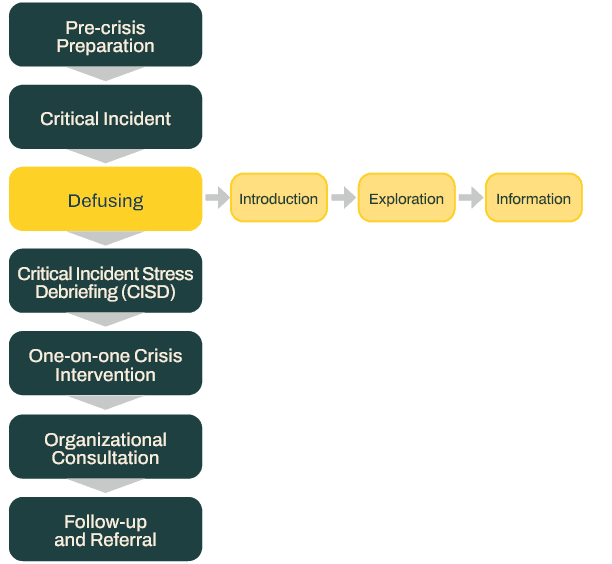Supporting One Another: Defusing after Critical Incidents in Social Services

Social service workers are often at the forefront of providing care and support to individuals facing mental health crisis, trauma, and complex life challenges. Clients’ needs may not always be regularly met, creating a high-stress work environment. This kind of work can be emotionally taxing, making it important for workers to have a supportive team where they can express their feelings, gain perspective, and share coping strategies – especially following a critical incident. A critical incident is an event or series of events that overwhelms an individual’s ability to cope.1 This article will explore Critical Incident Stress Management (CISM), Critical Incident Debriefing (CISD), and defusing, as well as provide strategies for effective defusing with your team after a critical incident.
Definitions and Key Concepts1
| CISM | CISD | Defusing | |
| Definition | A multi-component intervention program | A specific intervention within CISM involving a structured group discussion | A less formal, shorter-term intervention immediately after the incident |
| Purpose | To support individuals through the recovery process after trauma, reduce the likelihood of PTSD, and improve coping skills | To help individuals process their emotions in a safe environment, normalize reactions to trauma, and reduce the risk of developing PTSD | To provide immediate support, reduce emotional overload, and prevent further psychological distress right after the incident |
| Timing | Established before incidents and applied during and after an incident | Typically held 24-72 hours after the incident but no later than 1 week | Conducted as soon as possible after the event (usually within hours) |
| People Involved | Mental health professionals, peer support team members, affected individuals, management or leaders from organizations | Facilitators trained in CISD (often mental health professionals), affected individuals, colleagues, or peers involved in the traumatic event | Peer support, affected individuals, or first responders involved in the incident |
In the CISM framework, there are several key stages designed to help individuals recover from traumatic events. The process is multi-faceted and involves immediate support through defusing, followed by longer-term support through debriefing and other recovery methods. To better understand these steps, see the graph below which outlines the core components of the CISM process.

Adapted from: George S. Everly, Jr., Ph.D., C.T.S. and Jeffrey T. Mitchell, Ph.D., C.T.S. The International Critical Incident Stress Foundation
The Importance of Defusing
CISD was initially developed for small groups, such as firefighters and emergency responders who have encountered powerful traumatic events.1 While social service workers do not experience critical incidents with the same frequency and impact, they still face unprecedented events that, while not necessarily classified as “powerful” traumatic incidents, can still have a significant psychological impact. In fact, social service workers are often exposed to secondary trauma,2 which may not require a formal debrief but still has a profound psychological effect. In many cases, social service workers do not have access to formal or trained facilitators for debriefing, which makes it essential to develop a culture of care and peer support within the team. WorkSafeBC also provides access to a qualified mental health professional to process the traumatic incident with workers.
To develop peer support within the team, defusing is crucial as it helps reduce emotional overload and provides immediate relief after a critical incident. When employees experience stress or secondary trauma, it can lead to emotional exhaustion. The defusing process allows team members to share their emotional reactions in a safe, non-judgmental space which is key to preventing long-term psychological harm. Having a team that actively supports one another after such incidents is fundamental in maintaining the psychological well-being of workers.
Effective Defusing Strategies
Defusing can be most effective when following a structured process. Download our quick reference guide on Team Defusing After Critical Incidents.
Step 1: Introduction
- Gather individuals directly involved in the critical incident once the situation has been resolved.
- Reassure that participation is voluntary and that what’s shared in the group stays confidential, fostering trust and openness.
- Clarify that the session is for team well-being and stress relief not for fact-finding or investigative purposes.
- Open the conversation by inviting the team to share their brief perspectives on the incident.
Step 2: Exploration
- Ask open-ended questions to better understand individual experiences.
- Reassure and acknowledge the stress and challenges the team and each individual may have faced.
- Identify recurring concerns that may be affecting the team for opportunities for collective problem-solving.
- Summarize important thoughts or feelings shared to reinforce the sense of mutual understanding.
Step 3: Information
- Assure one another that reactions are natural and common in such situations to reduce any stigma around feeling stressed or upset.
- Share practical methods to manage stress and emotions.
- Encourage the team to step in and relieve or cover a team member who may need more time to decompress to reinforce the idea of mutual care and shared responsibility.
- Remind the importance of leaning on one another, offering support, and checking in with each other—both during and after the incident.
If you have experienced a traumatic event in the workplace, please contact WorkSafeBC’s Critical Incident Response Team at 1-888-922-3700.
References
- Critical Incidents and Stress. Canadian Union of Public Employees. CUPE, 12 Apr. 2024
- Critical Incident Stress Debriefing (CISD). Mitchell, Jeffrey T. , American Academy of Experts in Traumatic Stress, 2007
- How We Debrief: An Interpretive Description of Social Service Community Workers’ Experiences. Krywucky, Andrea C. 2023, The University of Western Ontario
- Critical Incident Stress Management (CISM) and Defusing. Nebraska Department of Health and Human Services, 2006, adapted from the ICISF Group Crisis Intervention Instructor’s Manual,